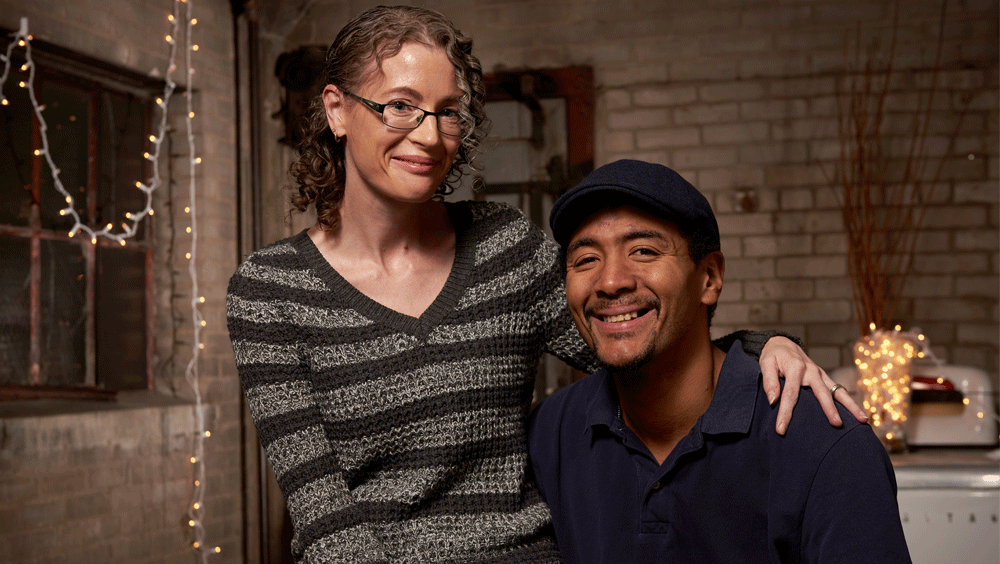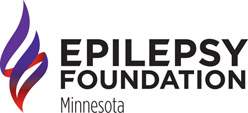Thriving with Epilepsy: Sarah DuCloux-Potter
Confronting her seizures was a long and tough process for Sarah DuCloux-Potter. She rationalized them as nightmares and naps, and went through some difficult times to get to the active and joyful life she currently lives. Accepting a new reality has allowed her to take control of both her life, and her epilepsy.

Sarah's Journey with Epilepsy
Accepting a new reality can be hard. This was the case for Sarah DuCloux-Potter, who for months blamed her random bruises on nightmares she couldn’t remember. This denial continued even after visiting a neurologist who explained these “nightmares” were actually seizures. She took her prescribed medication, but still had her doubts.
It wasn’t until she and her then-boyfriend (now husband) Les, met with an epileptologist who explained what was happening during her black-outs that she began to confront the reality of her complex-partial seizures. With that reality came depression and anger. Sarah’s daughter was just two years old at the time so she began looking into assisted living, thinking that’s what would be best for her family.
“I felt like everything around me was crashing on my head. How was I going to work or take care of my kid if I was like this,” Sarah thought. “But Les wasn’t having that at all.”
Things became even harder after she experienced a tonic-clonic seizure at work. This was the first her co-workers learned of her seizures, and it didn’t help that they had previously accused her of taking drugs because of the weight loss and memory issues that occurred as a result of her medication and postictal confusion.
“When I went back to work, everyone treated me like I was no longer competent and able to do my job,” says Sarah.
Sad and fed up, Sarah contacted the Epilepsy Foundation of Minnesota (EFMN) and asked for help. An EFMN staff member came to Sarah’s work and gave an educational training to the staff. With a better understanding of her condition the situation with her co-workers improved. This marked the beginning of a strong and continued connection between Sarah and EFMN.
When the Creative Arts program started, Sarah was excited to share her work. She submitted writings and visual art.
“It was amazing when I sketched out my aura using sharpies and had people come up to me and say, ‘That’s my aura too!’ I thought I was weird. It turns out, I’m not alone.”
Sarah continued to get involved by participating in the annual Rise Above Seizures Walk, advocacy, peer mentoring for newly diagnosed people, volunteering at events, and attending connect groups.
Outside of her involvement with EFMN, Sarah began running as a way to “turn everything around and get healthy.” Running helped relieve stress and get over the depression, and she became hooked on the race atmosphere right away. Soon she was competing in trail races.
“Every step you could fall, but I laughed so much. I tripped a lot, stubbed my toes, scraped my knees and hands, and loved every minute.”
The competitive nature of races resonated with Sarah because as she puts it, “I like to win.” This has carried over into her everyday life as she’s found ways to overcome her epilepsy and keep it from affecting her career, like setting up a home office that allows her to work on days when she has a seizure.
“My epilepsy doesn’t affect me much anymore because I don’t let it. I am open about it, and that lets me be the one in control. I feel empowered instead of ashamed, but that's because I learned to talk about it without shame and got some semblance of control in my life through work, school, hobbies, friends, and family.”
The transition from denying to embracing a new reality took years, but the journey taught Sarah that it takes time to come to grips with a “new normal” and that’s perfectly ok. Having strong emotions and letting them out is part of the process, but keeping in mind that you’re not alone is crucial.
“There are a whole bunch of us living wonderful, fulfilling lives. We didn’t get there overnight. Find someone to lean on, you don‘t have to go at it alone. You will find your new normal. It will be beautiful, because you are wonderful just the way you are.”

.
To get help with workplace challenges or schedule a workplace training, contact EFMN’s Information and Referral Services.
The creative arts program is designed to connect people with seizures, raise awareness of the condition, and showcase the artistic talents of people living with epilepsy. April 3rd marks the beginning of an 8-week art therapy program which you can learn more about here.
